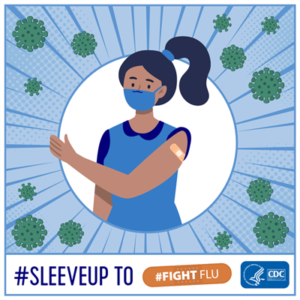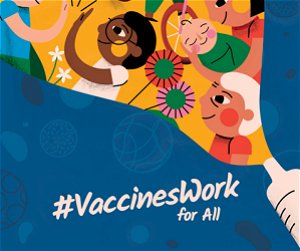 The U.S. Centers for Disease Control and Prevention (CDC) recently published an updated version of its guide for parents titled, Your Child’s First Vaccines: What You Need to Know. In addition to being posted on the CDC’s website, the guide is also available in .PDF format, and the CDC encourages doctors to provide parents with a copy of the guide when they bring their children in for their first immunizations. Continue reading
The U.S. Centers for Disease Control and Prevention (CDC) recently published an updated version of its guide for parents titled, Your Child’s First Vaccines: What You Need to Know. In addition to being posted on the CDC’s website, the guide is also available in .PDF format, and the CDC encourages doctors to provide parents with a copy of the guide when they bring their children in for their first immunizations. Continue reading
Should You Still Get a Flu Shot During the COVID-19 Crisis?
 Among the many concerns raised by the COVID-19 crisis, one question many people have is whether they should still get their annual flu shot. The 2020-2021 flu season is here, and this is the time of year when many individuals and families visit their doctors, pharmacies and health departments to get vaccinated. Continue reading
Among the many concerns raised by the COVID-19 crisis, one question many people have is whether they should still get their annual flu shot. The 2020-2021 flu season is here, and this is the time of year when many individuals and families visit their doctors, pharmacies and health departments to get vaccinated. Continue reading
How Will COVID-19 Impact the 2020-2021 Flu Season?
 As the entire world anxiously awaits the arrival of a safe and effective vaccine for COVID-19, flu season is now upon us as well, and that means it is time to start thinking about the annual flu shot. The U.S. Centers for Disease Control and Prevention (CDC) has provided guidance for getting a flu shot during the COVID-19 crisis, and it has published a number of other resources related to the impacts of COVID-19 on the 2020-2021 flu season as well. Here are some of the highlights: Continue reading
As the entire world anxiously awaits the arrival of a safe and effective vaccine for COVID-19, flu season is now upon us as well, and that means it is time to start thinking about the annual flu shot. The U.S. Centers for Disease Control and Prevention (CDC) has provided guidance for getting a flu shot during the COVID-19 crisis, and it has published a number of other resources related to the impacts of COVID-19 on the 2020-2021 flu season as well. Here are some of the highlights: Continue reading
Resources from World Immunization Week 2020
 Each year, the World Health Organization (WHO) recognizes World Immunization Week during the last week of April. For 2020, the theme was #VaccinesWork for All, and the WHO focused its awareness campaign on, “how vaccines as well as the people who develop, deliver and receive them are . . . champions by working to protect the health of everyone, everywhere.” Continue reading
Each year, the World Health Organization (WHO) recognizes World Immunization Week during the last week of April. For 2020, the theme was #VaccinesWork for All, and the WHO focused its awareness campaign on, “how vaccines as well as the people who develop, deliver and receive them are . . . champions by working to protect the health of everyone, everywhere.” Continue reading
Vaccination Information for Women Who are Pregnant
 During pregnancy, vaccinations can provide protection against certain diseases for both the mother and the child. As the Centers for Disease Control and Prevention (CDC) explains, “Pregnant women share everything with their babies. That means when a pregnant woman gets vaccines, she isn’t just protecting [herself]— she is giving the baby some early protection too.”
During pregnancy, vaccinations can provide protection against certain diseases for both the mother and the child. As the Centers for Disease Control and Prevention (CDC) explains, “Pregnant women share everything with their babies. That means when a pregnant woman gets vaccines, she isn’t just protecting [herself]— she is giving the baby some early protection too.”
While the CDC provides general vaccine recommendations for adults, it provides certain specific recommendations for women who are pregnant. If you are expecting a child, it will be important for you to speak with your doctor about getting vaccinated during your pregnancy. Continue reading
What Should I Do if My Child is Complaining of Shoulder Pain After Getting a Flu Shot?
 Shoulder pain is among the most-common complaints following vaccinations among both children and adults. In general, vaccine injections are expected to cause a moderate amount of shoulder pain, with this pain subsiding within 24 to 48 hours.
Shoulder pain is among the most-common complaints following vaccinations among both children and adults. In general, vaccine injections are expected to cause a moderate amount of shoulder pain, with this pain subsiding within 24 to 48 hours.
However, if shoulder pain following a vaccination persists, or if the pain is more than a mild throb at the injection site, it could potentially be symptomatic of a vaccine-related injury. These injuries, known as shoulder injuries related to vaccine administration (SIRVA), are among the most-common complications from vaccine injections, and they are a risk for vaccine recipients of all ages. Continue reading
Can a Vaccine Cause Vasovagal Syncope?
 Vasovagal syncope, a condition that results in fainting due to a sudden drop in heart rate and blood pressure, is a condition that has been linked to several of the standard vaccinations that are recommended by the U.S. Centers for Disease Control and Prevention (CDC). While only a very small percentage of vaccine recipients will experience vasovagal syncope as a result of their vaccinations, for those that do, the consequences can potentially be severe. Continue reading
Vasovagal syncope, a condition that results in fainting due to a sudden drop in heart rate and blood pressure, is a condition that has been linked to several of the standard vaccinations that are recommended by the U.S. Centers for Disease Control and Prevention (CDC). While only a very small percentage of vaccine recipients will experience vasovagal syncope as a result of their vaccinations, for those that do, the consequences can potentially be severe. Continue reading
When Should Pain Go Away After a Flu Shot?
 Getting the annual flu shot provides important protection for you and those around you. The Centers for Disease Control and Prevention (CDC) says that, “[a] flu vaccine is the first and best way to reduce your chances of getting the flu and spreading it to others,” and it recommends that almost everyone six months of age and older get vaccinated against influenza each year.
Getting the annual flu shot provides important protection for you and those around you. The Centers for Disease Control and Prevention (CDC) says that, “[a] flu vaccine is the first and best way to reduce your chances of getting the flu and spreading it to others,” and it recommends that almost everyone six months of age and older get vaccinated against influenza each year.
The annual flu shot has a handful of potential side effects, but the CDC describes these side effects as “generally mild.” These side effects include, “[s]oreness, redness and/or swelling from the shot.” Continue reading
FAQs: Shoulder Pain and Vaccine Injury Compensation
 Shoulder injury related to vaccine administration (SIRVA) is among the most common of all vaccine-related injuries and illnesses. This is due predominantly to the fact that they are caused by vaccination errors rather than vaccine ingredients, which means that all vaccines that are administered via injection into the shoulder have the potential to cause SIRVA. Here are answers to some frequently-asked questions about recovering financial compensation for SIRVA under the National Vaccine Injury Compensation Program (VICP): Continue reading
Shoulder injury related to vaccine administration (SIRVA) is among the most common of all vaccine-related injuries and illnesses. This is due predominantly to the fact that they are caused by vaccination errors rather than vaccine ingredients, which means that all vaccines that are administered via injection into the shoulder have the potential to cause SIRVA. Here are answers to some frequently-asked questions about recovering financial compensation for SIRVA under the National Vaccine Injury Compensation Program (VICP): Continue reading
NIAID Director: 2019-2020 Flu Shot “Not a Very Good Match” for Most-Common Strain
 As the 2019-2020 flu season rolls on, the director of the National Institute of Allergy and Infectious Diseases (NIAID) has issued a warning that this year’s flu vaccine has shown limited effectiveness in fighting one of the most-common strains of the flu virus. According to CNN, NIAID director Dr. Anthony Fauci stated that this year’s flu shot, “[is] not a very good match for B/Victoria,” which has become one of the most-prevalent strains this flu season. CNN also reports that, “[c]hildren are particularly susceptible to influenza B/Victoria.” Continue reading
As the 2019-2020 flu season rolls on, the director of the National Institute of Allergy and Infectious Diseases (NIAID) has issued a warning that this year’s flu vaccine has shown limited effectiveness in fighting one of the most-common strains of the flu virus. According to CNN, NIAID director Dr. Anthony Fauci stated that this year’s flu shot, “[is] not a very good match for B/Victoria,” which has become one of the most-prevalent strains this flu season. CNN also reports that, “[c]hildren are particularly susceptible to influenza B/Victoria.” Continue reading
